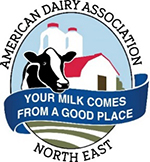The information below has been supplied by dairy marketers and other industry organizations. It has not been edited, verified or endorsed by Hoard’s Dairyman.

While Graybill’s Red Sunset Farm in Mifflintown, Pa., is more than 100 miles upstream from the Chesapeake Bay, creeks near the farm ultimately feed into the Susquehanna River, which supplies about half of the fresh water that flows to the Chesapeake Bay. This means Graybill’s farming practices have a direct impact on the Bay.
“Being situated within the Chesapeake Bay watershed,” explained Graybill, “has required us to look at farming differently. With 60 cows, we’re considered a small dairy. But we want to demonstrate that environmental improvements can be made on farms of all sizes.”

Red Sunset Farm proactively protects the water by reducing soil erosion to keep contaminants out of the waterways. Graybill plants cover crops to control soil erosion and retain nutrients on the land. He practices “no-till” farming to increase water absorption by the soil, so that it acts as a sponge to decrease runoff and make water available to plants even during dry periods.
Graybill has also constructed manure storage to allow the farm to manage their use of manure for fertilizing crops. And recognizing the correlation between bees and the pollination of their crops, Red Sunset is home to more than 45 honey bee colonies.
While this is the first national recognition Graybill has received, it is not the first time Red Sunset Farm has been honored for its environmental practices. In 2019, the farm earned American Dairy Association North East’s “Dairying for Tomorrow” award for Environmental Stewardship. Also that year, the farm was honored by Maryland & Virginia Milk Producers Cooperative Association as a milk “Producer of the Year.”
“Protecting the environment is extremely important. After all, we live here,” said Graybill. “This land is beautiful and we want it to stay that way. I’m determined that this farm will be better when I leave it than it was when I received it. To me, that’s being an environmental steward.”








